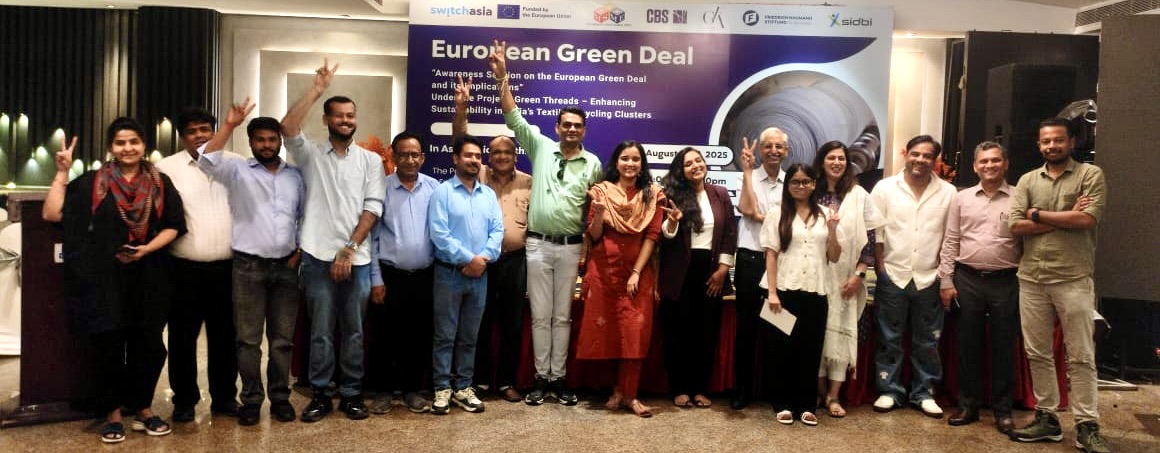
India’s textile recycling hubs in Panipat, Amroha, and Bhojpur are central to the global circular economy. Panipat alone processes around 60% of the country’s recycled textile waste, including significant imports from Europe, and generates an annual export turnover of $1.7 billion. Yet this economic success comes with steep costs: outdated technology, high water and energy use, unsafe working conditions, and nearly 1.4 million tonnes of CO₂ emissions annually in Panipat. Most workers are underpaid women and migrants, with few opportunities to acquire new skills.
These clusters now face mounting pressure from changing global rules. Under the European Green Deal, textile producers must comply with stricter sustainability standards, including the forthcoming Digital Product Passport (DPP), restrictions on waste exports, and more rigorous reporting requirements. Indian businesses are also under pressure at home, with frameworks like Business Responsibility and Sustainability Reporting (BRSR Core) and the HSN tracking system demanding higher levels of accountability. For many MSMEs, however, lack of awareness, financing, and technical support leaves them ill-prepared to meet these new demands.
Diagnostic studies by SIDBI and the Foundation for MSME Clusters (FMC) confirm that there is strong willingness to embrace sustainability if the transition is gradual, inclusive, and backed by the right support systems. To respond, the Green Threads project, funded by the European Union under its SWITCH-Asia programme, has been launched with a consortium of global and Indian partners. FMC leads implementation in Panipat, supported by Copenhagen Business School on branding and traceability, SIDBI on green finance, Global Fashion Agenda on policy engagement, and Reverse Resources with advanced traceability technology. The goal is to transform Panipat into a global hub for sustainable textiles by promoting resource efficiency, sustainability branding, and access to green financing.

As part of the initiative, on 23 August 2025, FMC and the Panipat Exporters Association recently hosted a workshop at Days Hotel by Wyndham, Panipat, bringing together exporters and industry leaders to better understand the EU’s evolving textile regulations. The event drew representatives such as Lalit Goyal, President of the Panipat Exporters Association, and Vinod Dhamija, President of the Haryana Chamber of Commerce and Industry, reflecting strong local backing for a green transition.
Opening the session, Mukesh Gulati, Executive Director of FMC, called on Panipat’s exporters to align with international standards: We are not here as outside experts but as long-term partners. Our aim is to work hand in hand with Panipat’s industries to take the cluster at least two steps higher than where it stands today.
International experts outlined what lies ahead. Global Fashion Agenda shared insights on EU eco-design and durability requirements; Reverse Resources demonstrated traceability tools to track textile waste in line with Europe’s Extended Producer Responsibility (EPR) framework; and Green Story showcased how the Digital Product Passport can document a product’s environmental footprint across its life cycle, from water use to repair and recycling.
The workshop drew strong engagement from exporters, HR leaders, and compliance managers, who gained clarity on future EU mandates, carbon tax implications, and financing opportunities. For Panipat, these are not just regulatory hurdles but a chance to modernize and lead in the emerging global market for sustainable textiles. With the backing of the EU and its SWITCH-Asia programme, the Green Threads initiative aims to ensure India’s recycling clusters are not left behind but emerge as frontrunners in circular fashion.
The urgency of this transition is clear. Worldwide, the fashion industry generates 10% of global carbon emissions, 20% of wastewater pollution, and 92 million tonnes of textile waste each year, with less than 1% recycled into new garments. For clusters like Panipat, which already shoulder a major share of India’s textile waste, adapting to this new reality is not just about compliance, it is an opportunity to position India as a leader in the global shift to fashion sustainability.
Featured in the media:
- ANI https://www.aninews.in/news/business/foundation-for-msme-clusters-leads-panipats-green-transformation20250825181240/
- PTI https://share.ptinews.com/press-release/foundation-for-msme-clusters-leads-panipat's-green-transformation/2853860
- The Wire https://share.google/4vz5a43OxmAZGbYhC
- The Tribune https://www.tribuneindia.com/news/business/foundation-for-msme-clusters-leads-panipats-green-transformation/


